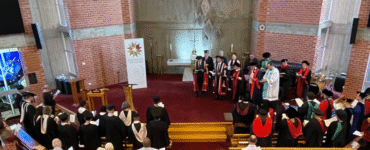This article was originally published on ABC Religion and Ethics, 20 December 2018.
Greg Sheridan’s God is Good For You: A Defence of Christianity in Troubled Times is a vigorous and passionate defence of Christianity. It argues, exhorts, admonishes and informs. Christians, especially their leaders, are encouraged to lift their game. Atheists are invited not to be quite so sure of their atheism ― or, at the very least, have better arguments for it. More generally the citizens of the “West” ― Christian or not ― are advised not to ignore or dismiss their Christian heritage. He sketches a future of Australian Christianity that accepts its minority status but which lives into that unfamiliar condition boldly.
Moreover, unlike some of the cultural warriors defending the so-called “Judeo-Christian” tradition, Sheridan does at least remind his readers that Christianity is nothing without its foundation in Jesus Christ. He makes this case in the second chapter, “The ragged edge of justice ― what Christians believe.”
As a fellow Christian there is much of Sheridan’s book that I welcome. I am glad it is being read and hope it generates debate and conversation. But for all that, there is something troubling in the way, in his crucial second chapter, Sheridan manages, in my judgement, to obscure the very figure he is trying to defend. The Jesus who emerges is quite uninteresting ― a rather predictable and conventionally religious figure. He is characterised mostly by a preoccupation with the “supernatural,” has a penchant for miracles, and is a dispenser of what Sheridan terms “transcendent justice.”
The authoritative but cryptic, compassionate but impatient, renewing but disruptive, consoling but confronting first-century Jewish prophet of the kingdom of God presented in the Gospels is nowhere to be seen in God is Good For You. The one whose life, death and resurrection unsettled, if not completely reconfigured, the prevailing categories of “messiah,” “God” and “salvation,” and who generated what an early theologian described as a “strange new hope” is hidden from view.
The concepts of the “transcendent” and “supernatural” loom large in Sheridan’s account of the basics of Christianity. They are the categories that he uses to push back against the naturalistic assumptions of the modern secular world. He acknowledges that these “transcendent beliefs are … startling to anyone not raised as a Christian.” For Sheridan, however, they are necessary if the biblical material is to be understood. He presents the New Testament as focused on “the supernatural claims of Jesus and the transcendent nature of God.” When the New Testament addresses the “lived life,” it is with a “sense always of the transcendent applied to the physical realities of life.”
In the specific engagement with beliefs about Jesus’s divine status, Sheridan is particularly concerned to resist claims that would reduce Jesus to a mere moral teacher devoid of any “transcendent” status. This resistance to the idea of Jesus as a moral teacher is based, in part, on Sheridan’s interpretation of Jesus’s Beatitudes (Matthew 5:3-11; Luke 6:20-26). They are presented as Jesus’s summons to his followers to live in a particular way. While acknowledging that, if more people lived according to the Beatitudes, the world would be more just, Sheridan nevertheless insists that the Beatitudes are only an “indirect call for justice.” They point instead to an “infinitely more transcendent justice.” Indeed, he makes the bold declaration that the justice of the Beatitudes “doesn’t include any political content at all.”
Now, even if the intent of this remark is to demarcate Jesus from contemporary notions of partisanpolitics, or from a particular political programme or ideology, this is a most surprising and outright odd claim. For the moment you deny the “political,” you also deny the social and relational ― and to deny those in name of defending the New Testament witness to Jesus is simply untenable. More tellingly, Jesus wasn’t crucified on a cross of the Roman Empire because he’d been talking about “the transcendent.”
Either/or
Sheridan thus seems caught in an either/or: between a “political” Jesus and his preferred “transcendent” or “supernatural” Jesus. I completely agree with him in wanting to defend the elevated status that the Christian movement has typically claimed for Jesus. I hold with him that Jesus is something other than an especially insightful teacher of ethics. I share his desire to push back against the naturalistic assumptions of much contemporary thought. But I also believe his categories are simply too blunt to do any serious interpretative work.
While wanting to engage the Gospels’ witness to Jesus, Sheridan’s own categories actually succeed in keeping the content of the Gospels at arm’s length. Consequently, at the very point where he is seeking to defend Christianity’s “central claim” he is potentially subverting it altogether. The following key passage focuses many of Sheridan’s key claims about Jesus and Christianity. It is also where the very problems I’ve just identified all converge. It is worth quoting in full:
One thing that the New Testament, the Apostles’ Creed and the general teaching of the Christian churches does not allow you to hold is that Christ was a moral teacher, a social worker or political revolutionary, but not divine and did not claim to be divine, or to establish a new system of belief, in short a new religion. Jesus certainly had a great concern for the poor, the dispossessed, the marginalised, and he commanded his followers to have a great concern for them. While that is one of the chief behaviour messages of Christianity it is not the central claim, the good news, the supernatural destiny that Jesus spoke of so often.
Whatever a “supernatural destiny” might actually mean, one thing is certain: it is not what Jesus spent any time talking about. True, in the Gospel of John, Jesus talks about “eternal life” but the richness of that concept would be seriously short-changed by equating it with a bland “supernatural destiny.”
If we truly want to engage what Jesus “spoke of so often,” it is necessary to turn our attention to his preoccupation with the “kingdom of God” or the “kingdom of heaven.” At least according to the Gospels of Matthew, Mark and Luke, if anything was central to Jesus’s ministry, it was this. Indeed, it wasn’t simply what he “spoke of” (although that he did, especially in his parables); he also enacted and embodied it in his healings, in his acts of table-fellowship, in his embrace of outcasts, as well as in his hope- and risk-filled journey to Jerusalem. All these activities were framed by his embrace of the Jewish idea of God’s coming reign and, by all accounts, his deep sense of his own pivotal place in it.
And it is this idea of the kingdom of God, and Jesus’s relationship to it, which cuts right through the either/or categories that define ― and severely constrain ― Sheridan’s account of Jesus. But it does this not because it points to a both/and relationship between these categories; rather, because it establishes a paradigm of its own.
The kingdom of God
Although subject to many different definitions, the kingdom of God is something that comes from beyond this world, takes form in this world, but is not limited to this world. The hope for it was deeply embedded in Jewish messianic hope. Jesus’s presentation of this kingdom can only be appreciated against that background. His preaching about it can only be understood in the light of the prevailing and diverse first-century Jewish hopes in the midst of which he lived and into which he spoke.
One scholar of early Christianity, Christopher Rowland, summarises the meaning of “kingdom of God” in Jesus’s ministry and against the background of Jewish ideas about salvation in these terms:
The point is frequently made in discussions of the meaning of the phrase [the “kingdom of God”] that it is not used in a spatial sense of particular territory, unlike the kingdom belonging to a king, but means God’s sovereignty and rule. Nevertheless, it would be wrong to give the impression that the phrase is to be understood in a purely spiritual sense … For God’s rule and authority were ultimately to be manifested in the physical world. Salvation for a Jew was not primarily some mystical deliverance for the spirit to enter a private communion with God in the world beyond, but the manifestation on earth of God’s authority over the universe and the setting right of all that was wrong. We must not misrepresent the understanding of God’s reign in the preaching of Jesus by stressing an individual, otherworldly experience at the expense of the restoration of the community and the physical order.
Rowland goes on to point out that, with its reference to God’s kingdom coming and God’s will being done on earth, the Lord’s Prayer (in the version included in the Gospel of Matthew) “is an accurate exposition of the essential features of the Jewish (and Jesus’s) belief concerning the eschatological and this-worldly character of the kingdom.”
Of course, to affirm this and to accept this paradigm is only the start of interpreting it and living it out. Interpreting it is complicated because of the different ways Jesus’s relationship to it is presented and understood in the Gospels. To some extent, notwithstanding much debate on these matters, the overall posture of the New Testament writers reflects a general acceptance that the kingdom has come in Jesus and yet that it is still to come.
Living in this in-between time is as complicated as is interpreting its meaning. The church’s track record of doing so is decidedly mixed. Too often we have seen ourselves as the kingdom on earth exercising dominion over other kingdoms, if not actually being intent on conquering them. Around these issues much more needs to be said. But the present point is that if Christianity is centred on Jesus, then any fresh engagement with Christianity, let alone any defence of it, must be prepared to measure itself against the details of the New Testament witness to him.
To be honest I’m not sure that I would be inclined to invest much in defending Christianity if it rests on the figure of Jesus presented by Sheridan, however well-intentioned Sheridan is. This Jesus is just too mono-dimensional. The complexity with which Sheridan rightly describes the relationship between Western culture and its Christian roots, or the detail he admirably gives to the often inspiring stories of Christians (including of some of Australia’s politicians) is simply absent from his account of Jesus.
This is surprising given Sheridan’s comment in the chapter on Christianity’s core beliefs: “Real religion, like a real person, looks simple from a distance, but it is always complex up close.” Within Christianity, nowhere is this truer than in the presentations of Jesus in the New Testament.
The claim of justice
What hangs on this? Quite a lot, actually. It is certainly not merely a case of playing academic games to get the theological concepts right. Nor is it simply that the kingdom of God framework subverts Sheridan’s political/transcendent contrast. Ultimately, it leads to quite different understandings of justice than those he attributes to Christianity.
Recall the title of Sheridan’s second chapter: “The ragged edge of justice ― what Christians believe.” Justice is presented as a central to Christianity. Most Christians would, I think, agree. But justice can be defined in many ways. And the concept of justice which emerges from Sheridan’s reflections on it is much closer to moralism than it is to the renewing, restorative and unconventional justice that is associated with Jesus.
So what does Sheridan say about justice? He claims that the “pledge to justice” is one of Christianity’s “strongest attractions.” The Christian God, he writes, “represents justice” ― even if this justice has a certain “ragged” quality to it. The way he develops this theme is closely related to the question of free will to do right or wrong. The argument quickly turns to the justice of eternal reward or punishment. Behind it all, there is what he terms “the logic of justice” which “demands the consequences of moral choice.”
The argument comes to its pointy end when he considers the eternal fate of non-Christians ― or, more specifically, of “good people.” It is, he writes, “simply incompatible with justice, that … countless good people I’ve met who are not Christian, are destined to spend eternity in hell.” The threads linking free will, moral choice, moral consequences and eternal fate are not at all easy to follow. But the conclusion, rather than truly reflecting the logic of God’s justice, contradicts it.
Setting aside the difficulties in interpreting the New Testament references to “hell,” the logic of the Christian gospel is precisely that God’s love is not offered as a reward for being good. This is a moralistic idea of salvation which assumes a moralistic God. It is neither Christian salvation nor the Christian God. Deeply embedded in the Christian gospel is the view that it is not our goodness which guarantees or warrants God’s love: God’s grace is that guarantee.
That this eludes Sheridan is, in my view, another consequence of him bypassing Jesus’s proclamation of the kingdom of God. It is not simply that the kingdom of God subverts the political/transcendent binary discussed above. Time and time again, through his teaching and actions Jesus turns common assumptions about this “kingdom” on their head. His account of who is “in” and who is “out” of the kingdom subverts prevailing ideas about just what constitutes virtue ― or goodness ― in the eyes of God.
Just think of the parable of the labourers in the vineyard, and its most unjust punchline: “the last will be first, and the first will be last.” In the parable of two sons, Jesus declares to religious leaders and others gathered in the temple, “the tax collectors and the prostitutes are going into the kingdom of God ahead of you.” In the parable of the wedding banquet, after all the right people knocked back the invitation, those gathered in were “both good and bad; so the wedding hall was filled with guests.” Or think of the crowd outside Zacchaeus’s house grumbling that Jesus had gone to be the guest of “a sinner.”
Yes, more needs be said about the connections in the New Testament between forgiveness, repentance, grace and judgement. But what cannot be denied is that by delving deeply into the roots of his Jewish faith and its hope, Jesus radically unsettled the prevailing understanding of those connections.
Arguably no New Testament writer was so gripped by this theological revolution as the apostle Paul. When he wrote in his letter to the Romans that “Christ died for the ungodly” he served notice for all time on moralistic forms of religion, on every assumption that God favours “good” or “spiritual” people, and on all claims to religious privilege. For Paul, the Christian gospel is the great moral leveller in which God’s grace breaks through all our efforts at self-justification. The driving force of the gospel is not a quid pro quo between God’s justice and human goodness. Paul grounds the gospel in God’s love, kindness and mercy ― three terms, it might be noted, which never appear in Sheridan’s chapter subtitled “what Christians believe.”
*
Greg Sheridan is right to make a case for Christianity, to challenge the prejudices sometimes directed at it, and to counter the widespread ignorance of its claims. But any defence of Christianity has to be grounded in the Gospels’ witness to Jesus.
As I said earlier, Sheridan’s effort to include claims about Jesus as part of his defence of Christianity is welcome. It properly counters the current tendency to defend Christianity as a particular social group whose rights must be protected. In the public perception of Christianity defending itself, there is a risk that beliefs about Jesus have become almost incidental.
There is a further risk that Christians will come to be known as people insisting on their religious liberties rather than as followers of Jesus. But if we are to be known as followers of the Jesus who is presented in the New Testament, we need to have our own thinking about Jesus more deeply shaped by his own proclamation and embodiment of the kingdom of God.





What I like about Sheridan is his courage in putting to print his understanding of his faith. His claim is not to be an acedemic nor a theologian, but a communicator. Geoff. Thomson adds a further perpective, closer to the reformed position. I hope Greg’s book will encourage further exposition of Australians being part of the body of Christ